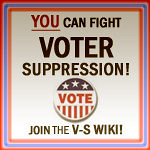 In a classic example of confusing ballot design, a “straight party” vote in North Carolina does not include the presidential contest. If you want to vote for a president, you need to make an additional mark in the presidential contest even if you’ve chosen a straight party vote. (See detailed instructions in the first comment.)
In a classic example of confusing ballot design, a “straight party” vote in North Carolina does not include the presidential contest. If you want to vote for a president, you need to make an additional mark in the presidential contest even if you’ve chosen a straight party vote. (See detailed instructions in the first comment.)
This policy has been in place for over 40 years (added by Dixiecrats in 1967), and historically has resulted in at least a 1% “undervote” — people not choosing a presidential candidate. With huge numbers of new voters this year, there’s a lot of concerns that it could be even higher. While there are signs up in polling places, and many (most?) poll workers give instructions as they give the ballots out, there are already many reports of people mis-voting.
This is exactly the kind of situation where we hope the Voter Suppression Wiki can add a lot of value, supplementing the other educational efforts. So let’s give it a try, and help get the word out!
I started by created an incident page, linking out to various reports of this, including an article in the Charlotte Observer, the snopes.com page, the alert from Black Box Voting.com, and a Daily Kos diary … and a brainstorming thread for ideas about getting the word out more broadly. This is a decent initial reference for anybody wanting to understand or write about the story — or to double-check its validity.
 A good next step is to try to get more blog, press, and media coverage of this in North Carolina … and here’s where it’s up to everybody, not just me. If you live in North Carolina, contact your local media outlets if they haven’t covered it yet; if you know some bloggers and journalists there, please forward them this link or the incident page, and ask them to cover the story.  If you’re a blogger, please consider writing about it — and make sure to include instructions for what voters need to do!
A good next step is to try to get more blog, press, and media coverage of this in North Carolina … and here’s where it’s up to everybody, not just me. If you live in North Carolina, contact your local media outlets if they haven’t covered it yet; if you know some bloggers and journalists there, please forward them this link or the incident page, and ask them to cover the story.  If you’re a blogger, please consider writing about it — and make sure to include instructions for what voters need to do!
We can also supplement the media with our own individual networks. If you’ve got friends and family in North Carolina, make sure they know about this issue — and ask them to help by telling their friends and family too. There was a great example of this in a thread Jay Dayreth (aka urthwalker) started on Daily Kos: a commenter mentioned he had just alerted his 70-year-old parents and added “There is no way my elderly parents would have figured this out.”
In situations like this, the one-to-one connnections really do make a huge difference, complementing information in the media and from election officials. The goal is to reach potential voters multiple ways; still, in general people are most likely to take the time to listen — and remember — if they’ve heard about it directly from somebody they trust.
I’m sure there are plenty of other ways a grassroots effort can help — suggestions welcome, here or on the wiki.
And for those who have been reading posts about the Voter Suppression Wiki and debating whether it’s something you’re interested enough in to find the time, this is a great chance to get involved.
Please, help get the word out!
jon
The Voter Suppression Wiki is a non-partisan hub of information and action around efforts to suppress votes in the 2008 U.S. elections. For more information, please see our strategy and talking points, Baratunde Thurston’s launch post on Jack and Jill Politics, and my series of posts on Liminal States. If you’d like to get involved, please introduce yourself, check the help wanted, roll up your sleeves, and jump in!
jon | 19-Oct-08 at 8:47 pm | Permalink
VotersUnite.org recommends that voters avoid “straight party” votes, because of the risk of voting machine error as well as confusion. For North Carolina voters who want to choose the straight ticket option, here are Joyce McCloy’s instructions from Confused North Carolina Voters Throw Votes Away – Straight Ticket Voting Warning on Black Box Voting.com: